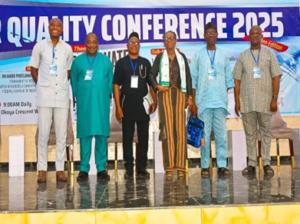In the first quarter of 2025, the Federal Ministry of Water Resources and Sanitation reaffirmed its commitment to improving the health and nutrition landscape in Nigeria through strategic Water, Sanitation, and Hygiene (WASH) initiatives. These efforts align with the broader national nutrition agenda, especially in reducing waterborne diseases and promoting safe hygiene practices that directly impact nutritional status and overall public health.
Strengthening National Commitment Through Stakeholder Engagement
 As part of its engagement in the National Committee on Food and Nutrition (NCFN), the Ministry successfully convened the National Annual Water Quality Conference, a landmark event that brought together WASH stakeholders to discuss sustainable strategies for water quality improvement. The conference provided a national platform for dialogue on safeguarding the health and wellbeing of Nigerians through enhanced water safety and sanitation policies.
As part of its engagement in the National Committee on Food and Nutrition (NCFN), the Ministry successfully convened the National Annual Water Quality Conference, a landmark event that brought together WASH stakeholders to discuss sustainable strategies for water quality improvement. The conference provided a national platform for dialogue on safeguarding the health and wellbeing of Nigerians through enhanced water safety and sanitation policies.
This collaboration with NCFN and other actors reflects the Ministry’s understanding of the close linkage between clean water access and nutritional outcomes—particularly in preventing diarrhea and other WASH-related diseases that aggravate malnutrition in children under five.
Innovative WASH Interventions Supporting Nutrition
The Ministry implemented two core interventions during the reporting period with tangible outcomes:
- Hand Hygiene for All Initiative
In a bid to reduce the incidence of diarrhea, acute respiratory infections, and school absenteeism, the Ministry organized a Hygiene Promotion Workshop for WASH officers from three Open Defecation Free (ODF) LGAs in Cross River State—namely Boki, Ikom, and Yala. The workshop, held from November 17 to 20, 2024, empowered facilitators through a training-of-trainers approach that equipped them with the skills to deliver effective hygiene promotion at the grassroots level.
- Menstrual Health Hygiene Management (MHHM)
In another impactful initiative, the Ministry conducted a training for Health Education Officers on menstrual hygiene and health management. This five-day workshop, held at Nut Conference Hall in Dutse, Jigawa State (December 15–20, 2024), focused on building state-level capacity using a skills-based methodology. The intervention aimed to promote dignity and reduce the stigma surrounding menstruation, especially for adolescent girls, thereby contributing to school retention and long-term well-being.
Nutrition Financing: Gaps in Implementation
While the Ministry received a budget allocation of ₦74,848,441 for nutrition-related WASH activities in the quarter, no funds were released or utilized during the period under review.
Forthcoming Events: Promoting WASH and Nutrition Synergies
The Ministry is poised to commemorate several critical awareness days in the coming quarters:
- World Water Day (March 23) – Focusing on nationwide sensitization on water safety.
- Menstrual Hygiene Day (May 28) – Aiming to deepen public education on menstrual health and dignity.
- Global Handwashing Day (October 15) – Highlighting the importance of hand hygiene at critical times.
- World Toilet Day (November 19) – Drawing attention to the health and environmental dangers of open defecation.
These events are designed to target the general populace, particularly in the FCT and surrounding regions, and serve as platforms for strengthening public understanding of WASH practices as essential to good nutrition and disease prevention.
The Federal Ministry of Water Resources and Sanitation remains committed to leveraging its mandate to support the nutrition agenda through effective WASH interventions. However, there is an urgent need to ensure timely release and utilization of allocated funds, and to scale up collaborations that bridge the gap between sanitation access and nutrition outcomes.
